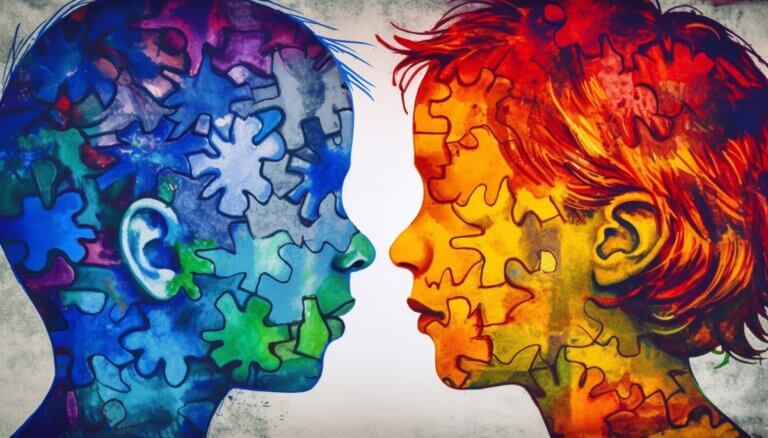Table of Contents
Self-Perception and Self-Regulation

Recognizing One’s Own Emotions
The ability to recognize and understand our own emotions is a fundamental aspect of emotional intelligence in everyday life. This awareness not only allows us to control our reactions to different situations but also contributes significantly to our psychological well-being. The application of emotional intelligence begins with self-awareness – a critical step that teaches us to understand the origins of our feelings and how our emotions influence our thinking and behavior.
The Connection Between Feelings and Thoughts
When we experience an emotion, it is often closely linked to certain thoughts. For instance, if we get angry in traffic, the triggering thought might be that we are wasting time or might arrive late. Our thoughts then amplify the experienced emotion. Consciously reflecting on our own thoughts and questioning them, such as “Is it really that bad to arrive ten minutes late?”, can change the intensity of our emotions and make us more balanced. The importance of emotional intelligence thus also lies in recognizing how closely feelings and thoughts are interconnected, in order to consciously influence them.
Self-Reflection and Mindfulness
The ability for self-reflection allows us to exploit the everyday relevance of emotional intelligence. By regularly taking time to reflect on our emotions, we identify patterns in our reactions and can deal with our feelings more proactively. An effective tool for this is the practice of mindfulness. It teaches us to experience the present moment without premature judgments and increases our emotional self-awareness.
- By keeping a daily journal, we can record which events evoke certain emotions and how we responded to them. This practice enhances our ability for self-observation and aids in developing a more nuanced emotional map of our inner lives.
- Meditation and targeted mindfulness exercises help us become aware of our own emotions without immediately having to react to them. Thus, we can learn to handle our feelings instead of being overwhelmed by them.
- Regular feedback sessions with friends or colleagues offer us the chance to gain external perspectives on our emotional behavior and sharpen our self-awareness.
The importance of emotional intelligence is reflected in each of these points. It shows that effective self-awareness includes not only recognizing and understanding our own emotions but also developing strategies to regulate them. By learning to better understand ourselves and our feelings, we can create a richer, more fulfilling, and emotionally intelligent everyday life.
Managing One’s Emotional World
The importance of emotional intelligence in everyday life cannot be overestimated. Its application plays a central role in our ability to recognize emotions in ourselves and others and to act accordingly. A crucial part is the management of one’s own emotions.
Emotion Recognition as a Cornerstone
Self-reflection and awareness of one’s own emotions are the first step towards managing emotions. Consider the example of a manager under pressure. By consciously perceiving his tension, he can apply targeted strategies to avoid falling into unproductive behavior. Emotional intelligence in everyday life thus becomes a prerequisite for effective self-management.
- Breathing exercises to master acute stress moments and calm the mind.
- Cognitive restructuring to transform negative thought patterns into positive ones.
- Meditation and mindfulness training to achieve deeper self-awareness and regulation.
Application of Emotional Intelligence under Stress
In stressful work situations, it is often the small breaks that make a big difference. A project manager faces the challenge of motivating his team, even though he himself is under the pressure of an approaching deadline. Here, it is crucial not only to recognize emotions but also to manage them effectively. Through short breathing exercises, he can find calm and maintain a clear mind to motivate his team.
The importance of emotional intelligence is also evident in decision-making. Instead of acting impulsively, emotional self-regulation allows for a more objective assessment of the situation.
Impact on Relationships
Finally, the application of emotional intelligence affects the quality of our relationships. A team whose leader has control over his own emotions and also considers the emotions of team members can work together more constructively and solve conflicts more efficiently.
In all these cases, the everyday relevance of emotional intelligence is unmistakable and shows how the conscious management of emotions can contribute to better well-being and success in the workplace.
Social Competence and Relationship Management

Social Competence and Relationship Management
Emotional intelligence in everyday life plays a crucial role when we engage with the art of empathy. This component of emotional intelligence is the ability to empathize with the emotional states of others. It is the key to how we communicate with our fellow humans and understand what they feel and need.
Applying emotional intelligence, such as through empathy, can have a transformative effect on our relationships both at work and in private life. When we actively practice empathy, we open a door to better connection with colleagues and loved ones by showing that we recognize and appreciate their perspectives.
Recognizing and Valuing Emotions
The ability to perceive emotions in others begins with attentive listening and observing nonverbal signals. A simple yet powerful act of empathy is when a manager in a conversation with a team member not only recognizes their concerns but also verbally acknowledges them. Example: “I see that this situation is really stressing you out. Let’s find a solution together.”
Empathy in Conflict Management
The importance of emotional intelligence, especially empathy, becomes particularly evident in conflict management. Here, empathetic behavior can help prevent escalations and instead foster an atmosphere of trust and mutual respect. A practical example of this is a misunderstanding between colleagues that is resolved through an open conversation in which both sides are allowed to express their feelings.
- Empathy is illustrated through attentive listening and genuine interest in the feelings of others.
- An empathetic approach in discussions promotes solutions that consider all parties involved.
- Empathy helps to strengthen personal bonds and solidify the social fabric in teams.
To underline the everyday relevance of emotional intelligence, consider a situation where a family member needs support after a bad day. An empathetic response might include taking time for a conversation and showing that you take their emotions seriously.
All this demonstrates that the importance of emotional intelligence is not just theoretical concepts, but very practical tools with which we can sharpen our social skills and enrich our togetherness. Empathy as a central element of emotional intelligence forms a fundamental bridge, deepening our understanding of our fellow humans and contributing to a more fulfilled coexistence.
Building and Maintaining Interpersonal Relationships
Emotional intelligence is an indispensable component when it comes to building and maintaining interpersonal relationships. The application of Emotional Intelligence in everyday life enables us to resolve conflicts, communicate better, and interact more empathetically. This highlights the relevance of Emotional Intelligence in daily life.
Significance of Emotional Intelligence in Building Interpersonal Relationships
Emotional intelligence is the ability to recognize, understand, and adequately respond to one’s own emotions and the emotions of others. This skill is of crucial importance for the establishment and maintenance of relationships. A high level of emotional intelligence helps us to address the needs of others and express our own emotions in a way that they are understood and respected by others.
- When dealing with feedback, emotional intelligence enables constructive reception and processing of criticism. Instead of reacting defensively, emotionally intelligent individuals can recognize and utilize growth opportunities in feedback.
- In disagreements, pronounced emotional intelligence allows one to remain calm and find solutions that are acceptable to both parties. This prevents escalations and promotes mutual understanding.
- In leadership positions, emotional intelligence is crucial to inspire and motivate teams and make fair decisions. Emotional awareness can improve the work atmosphere and contribute to increased productivity.
Practical Examples of Applying Emotional Intelligence
In the real world, the importance of Emotional Intelligence is evident in various scenarios. Take the example of a manager working with a conflict-ridden team. By employing emotional intelligence, this manager can better understand each team member and respond to them individually, leading to a harmonious cooperation and ultimately a more productive work environment.
Another example is relationship maintenance. Individuals with high emotional intelligence recognize the emotional needs of their partners and friends and are able to respond appropriately. This creates a deeper understanding and a stronger bond, forming the foundation for long-term relationships.
In summary
The significance of Emotional Intelligence cannot be overstated. Whether in a private or professional setting, it plays a central role in a successful and fulfilling life. By actively promoting these skills, we can improve our social environment and contribute to an overall more harmonious coexistence.
Summary
Emotional intelligence (EI) plays a crucial role of Emotional Intelligence in everyday life and is fundamental for personal growth and interpersonal relationships. It refers to the ability to recognize, understand, and manage one’s own emotions, as well as to interpret and adequately respond to the emotions of others.
Application of Emotional Intelligence
The application of Emotional Intelligence begins with self-awareness: the sensitive understanding of our feelings and the resulting thoughts. By learning to listen to our inner voice, we can better handle stress and choose reactions that benefit our mental well-being.
To recognize and utilize the importance of Emotional Intelligence, there are several strategies:
- Journaling supports reflection on daily experienced emotions, solidifies understanding of their origins, and helps recognize patterns in emotional experiences.
- Mindfulness practices such as meditation sharpen the conscious perception of feelings in the here and now, without having to react directly.
- Regularly receiving feedback strengthens self-view and enables one to see and improve one’s emotional reactions in context.
The importance of Emotional Intelligence becomes particularly apparent in stressful situations, where the short-term application of breathing techniques or cognitive reappraisal can help maintain a cool head. These techniques also empower us to skillfully handle emotionally charged work situations and make constructive decisions.
Emotional Intelligence in Professional and Personal Settings
At the professional level, the everyday relevance of Emotional Intelligence manifests as increased teamwork ability, more effective conflict management, and stronger leadership skills. In private life, EI promotes understanding and care in relationships, thus contributing to social cohesion.
To improve teamwork, leaders with high emotional intelligence can better respond to the individual needs of their employees and create a supportive work environment. In personal life, emotional intelligence helps develop a deeper understanding for the emotions of others and to act more empathetically.
Practical applications of EI include:
- Giving and receiving constructive feedback that contributes to personal and professional development.
- Emotion regulation in disagreements, enabling a factual and peaceful resolution.
- Use of EI in leadership positions for inspiring motivation and fair decision-making.
The ability to read emotions in oneself and others and to respond appropriately is a robust foundation for building stable social structures and for a balanced, satisfied life. By understanding the role of Emotional Intelligence in everyday life and embracing its principles, we can enrich our coexistence and sustainably improve the quality of our human relationships.
FAQ – Role of Emotional Intelligence in Everyday Life
How can emotional intelligence be specifically applied to handling conflicts in the workplace?
Emotional intelligence in the workplace enables individuals to handle conflicts constructively by recognizing, understanding, and regulating their own emotions and those of their colleagues. For example, an emotionally intelligent employee can maintain calmness in a heated discussion, actively listen, and show empathy to understand others’ perspectives and de-escalate the situation. Such thoughtful and understanding behavior promotes solutions based on mutual interests and strengthens work relationships.
How can emotional intelligence in the workplace help to resolve conflicts and promote better teamwork?
Emotional intelligence enables individuals in the workplace to recognize the feelings of others and respond appropriately, contributing to the de-escalation of conflicts and the strengthening of mutual understanding. By being able to regulate their own emotions and communicate empathetically, emotionally intelligent team members can create an atmosphere of collaboration where everyone involved feels heard and valued.
How can emotional intelligence help resolve conflicts in the workplace?
Emotional intelligence enables individuals to recognize the emotional states of colleagues and respond appropriately, leading to better understanding and more effective communication in the workplace. By actively listening and empathetically engaging with conflicting parties, a person with high emotional intelligence can facilitate the resolution process and help ensure that all involved feel understood and valued. These skills are crucial in defusing tensions and contributing to a constructive and cooperative work atmosphere.




